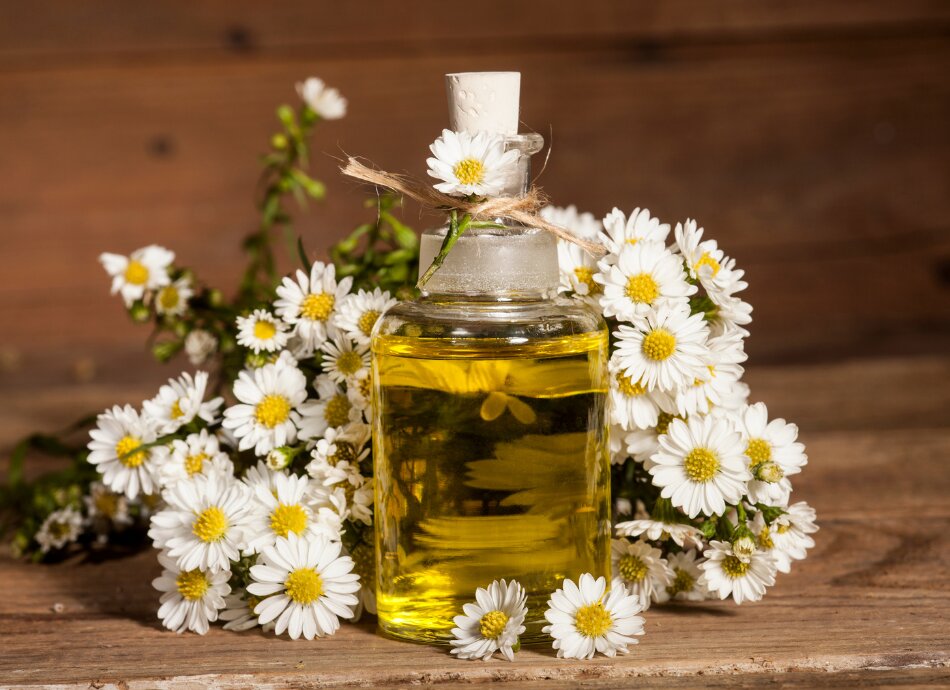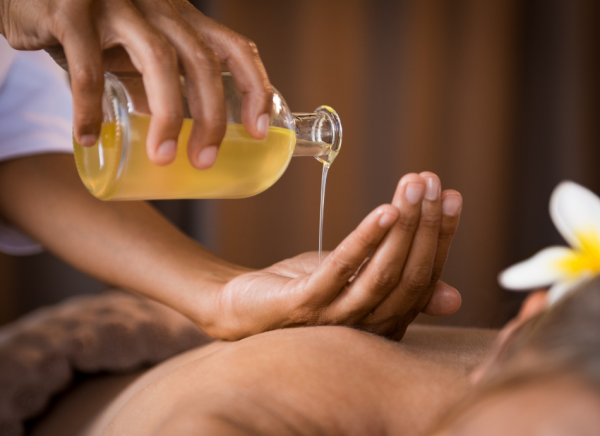Essential oils
Also called aromatherapy
Key points about essential oils
- Essential oils are obtained from plant products.
- They are used on the skin, inhaled, or immersed in water.
- If used incorrectly, they can be harmful.

Essential oils are highly concentrated extracts from the flowers, leaves, seed, bark, roots or peel of a plant. They have various aromas which may smell citrusy, woody, minty, floral, or spicy. Essential oils can have over 100 ingredients.
Essential oils can be applied or massaged into the skin, inhaled or immersed in water. Vaporiser solutions used in steam vaporisers often contain one or more essential oils in lower concentrations to those used in aromatherapy. Read more about complementary and alternative medicine.
- Never swallow essential oils.
- Dilute and use sparingly.
- If you use essential oils, they should be used sparingly, only a few drops at a time and always diluted in some other medium.
- The medium could be plain massage oil (cold-pressed vegetable oil, olive oil, coconut oil) or unscented base cream (but not a mineral oil cream, such as most brands of sorbolene or baby oil).
- Aromatic plant oils do not dissolve in water unless mixed with a dispersant first.
- Test a very small amount before you use it.
- Keep essential oils away from children. Treat them like medicines by storing them up, away and out of sight.
Essential oils have been widely used for many years in aromatherapy (applied to the skin or inhaled), balneotherapy (bathing in waters), and in perfumes.
The uses of some common ingredients in essential oils include:
- eucalyptus oil: nasal decongestant, disinfectant
- clove oil: toothaches
- peppermint: digestive disorders
- lavender: anxiety, insomnia and restlessness
- mānuka oil (Tea tree oil): antifungal, antibacterial, antiviral properties
- kānuka oil: antibacterial.

Image credit: Canva
It is not clear if essential oils are useful for treating conditions. Overall, there is little evidence of benefit. Essential oils are complex substances made up of hundreds of components. They can vary greatly in their composition depending upon the species of plant used, where it was grown, the way the oil is extracted, and the production process. Therefore it is difficult to compare different products and do research on their effects. Studies have shown that essential oils, as well as some of their individual components, may have useful antimicrobial or anti-inflammatory properties including when used as insect repellents. They may also relieve stress and aid with insomnia. However, it is important to use them safely.
| Essential oils are highly concentrated and even though they are natural, it does not mean they are completely harmless. |
Essential oils can have side effects, especially when used incorrectly. Some have ingredients that can interfere with medicines or conditions such as asthma or seizures. There have been reports of eucalyptus inhalation causing epileptic seizures (fits). There is also some evidence that they can interfere with how our natural hormones work.
Essential oils sold in Aotearoa New Zealand are not regulated by Medsafe and safety studies are limited. They are classed as a complementary and alternative medicine. Read more about complementary and alternative medicines. Because there is no regulation, the label may not list everything that’s in the bottle you are buying.
Essential oils are not safe to swallow
There have been claims made by companies producing essential oil products and their distributors that essential oils are ‘natural’ and therefore are ‘safe to consume’. Essential oils are not safe to consume and can cause significant poisoning even if small amounts are swallowed.
If swallowed, essential oils are rapidly absorbed and symptoms can develop as quickly as 30 minutes after ingestion (some individuals experience delayed symptoms up to 4 hours after exposure). Symptoms include nausea, tummy pain, vomiting blood, loss of consciousness, seizures.
Poisonings in children
Children, with their thin skin and immature livers, are more susceptible to toxic effects than adults. If swallowed, as little as 2 mL (less than half a teaspoon) of eucalyptus oil can cause significant poisoning in an infant. Peppermint used on children under 30 months of age can increase a risk for seizures.
Essential oils must be stored securely in a child-resistant container and kept out of reach of children. Read more: what to do in an emergency.(external link)
Skin reactions
Skin reactions including allergic reactions can occur if the oils are applied to the skin. This is more likely and severe with undiluted oils. Symptoms include rash, irritation, hives, burning, blistering. Allergic contact dermatitis is a delayed reaction which can occur with use of the oil onto the skin and it can also occur from fragrance diffusers. If you have a skin condition or a history of reactions to skin products you may be more susceptible. Often people with allergic contact dermatitis to essential oils react to many different oils, not just one, presumably because of shared constituents.
To use safely, before applying an oil to your skin, dilute and apply to a small area of skin. Wait 24–72 hours to see if there is an adverse reaction before using again. If you get a red, itchy rash or hives after applying essential oils, you may be having an allergic reaction.
Plant extracts(external link) Te Ara, NZ
References
- Essential oils – health warning(external link) WA, Australia
- Aromatherapy(external link) Better Health Channel, Australia
- Essential oils – poisonous when misused(external link) Poison Control, US
- Demystifying Rongoa Maori – traditional Maori Healing(external link) BPAC, NZ
- Allergic contact dermatitis to essential oils(external link) DermNet, NZ
- Eucalyptus oil inhalation–induced seizure – a novel, underrecognized, preventable cause of acute symptomatic seizure(external link) Epilepsia Open 2017;2(3):350-354.
- Ramsay JT, Shropshire BC, Nagy TR, et al. Essential oils and health(external link) YJBM 2020;93:291-305.
Credits: Healthify editorial team. Healthify is brought to you by health Navigator Charitable Trust.
Reviewed by: Maya Patel, Pharmacist, Auckland
Last reviewed:
Page last updated:





